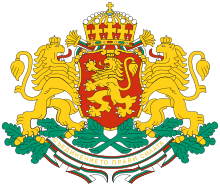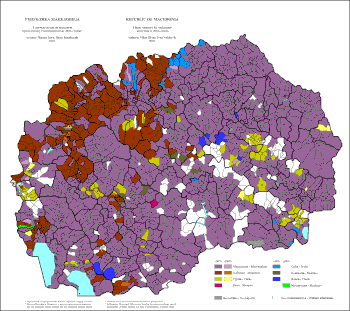Bulgarians in North Macedonia
Bulgarians are an ethnic minority in North Macedonia. Bulgarians are mostly found in the Strumica area,[2] but over the years, the absolute majority of southwestern North Macedonia have declared themselves Macedonian. The town of Strumica and its surrounding area (including Novo Selo) were part of Bulgaria between the Balkan wars and the end of World War I, as well as during World War II. The total number of Bulgarians counted in the 2002 Census was 1,417 or roughly 0.07%. Over 80,000 nationals of North Macedonia have received Bulgarian citizenship since 2001, and some 53,000 are still waiting for such.
| Total population | |
|---|---|
| 1,417 (census 2001)[1] | |
| Regions with significant populations | |
| Strumica and surrounding region | |
| Languages | |
| Bulgarian and Macedonian | |
| Religion | |
| Macedonian Orthodox Church | |
| Related ethnic groups | |
| Macedonians |
History
Middle ages and Ottoman rule
Throughout the Middle Ages and up until the early 20th century the Slavic speaking majority in the Region of Macedonia was more commonly referred to (both, by themselves and outsiders) as Bulgarians.[3][4][5]
Yugoslavia
Until the Balkan wars the majority of the Slav population of all three parts of the wider region of Macedonia had Bulgarian identity.[6] In 1913, the region of present-day Republic of North Macedonia became a part of the Kingdom of Serbia, thus becoming Southern Serbia. During World War II, when most regions of Macedonia were annexed by Bulgaria, a pro-Bulgarian ideology existed among the Slavic majority.[7][8] However, harsh treatment by occupying Bulgarian troops reduced significantly the pro-Bulgarian orientation of the Macedonian Slavs.[9] After the end of World War II, the creation of People's Republic of Macedonia and the codification of a new Macedonian language, a process of ethnogenesis started and a distinct national Macedonian identity was inaugurated into an established system. The new Yugoslav authorities began a policy of removing of any Bulgarian influence, making North Macedonia a connecting link for the establishment of new Balkan Communist Federation and creating a distinct Slavic consciousness that would inspire identification with Yugoslavia.[10] The authorities took also repressive measures that would overcome the pro-Bulgarian feelings among parts of the population, such as the Bloody Christmas in 1945.[11][11][12] In North Macedonia the Bulgarophobia increased almost to the level of state ideology,[13] and the communists were successful in removing all Bulgarian influence in the region.[11]
| Part of a series on |
| Bulgarians Българи |
|---|
 |
| Culture |
|
| By country |
| Subgroups |
| Religion |
|
| Language |
|
| Other |
|
The fall of Communism to present-day
By the time the then-Republic of Macedonia proclaimed its independence those who continued to look to Bulgaria were very few.[11] Some 3,000 - 4,000 people that stuck to their Bulgarian identity (most from Strumica and surroundings) met great hostility among the authorities and the rest of the population. With the fall of Communism the hostility decreased, but still remains.[11] Occasional trials against Bulgarophiles have continued until today.[14][15]
In the period 2002-2016 some 70,000 citizens of North Macedonia have acquired Bulgarian citizenship (which represents more than 5% of the self-declared ethnic Macedonians in the country in the 2002 population census), almost all of them acquired by descent and always on 1st position by acquired citizenship per country.
| Year | Period | Acquired citizenships | Position |
|---|---|---|---|
| 2002-2012[16] | 22.01.2002-15.01.2012 | 44211 | 1 |
| 2012[17] | 23.01.2012-22.01.2013 | 8185 | 1 |
| 2013[18] | 23.01.2013-22.01.2014 | 4388 | 1 |
| 2014[19] | 01.01.2014-31.12.2014 | 1874 | 1 |
| 2015[20] | 01.01.2015-31.12.2015 | 4315 | 1 |
| 2016[21] | 01.01.2016-31.12.2016 | 6196 | 1 |
| 2017[22] | 22.01.2017-31.12.2017 | 1150 | 1 |
| 2018[23] | 01.01.2018-31.12.2018 | 3619 | 1 |
| 2019[24] | 01.01.2019-31.12.2019 | 5628 | 1 |
| Total | 01.01.2001-31.12.2019 | 80000+ | 1 |
Politics
Bulgarians in North Macedonia do not have their own political parties, but still have political activity. Many politicians have revealed their affiliation to Bulgaria after leaving the political stage, such as Ljubčo Georgievski and Antonio Milošoski.[25] During the last few years, rising economic prosperity and the EU membership of Bulgaria has seen around 60,000 Macedonians applying for Bulgarian citizenship;[26] in order to obtain it they must provide evidence of their Bulgarian origin and sign a statement declaring they are Bulgarians by origin. About 50,000 Macedonian nationals have received Bulgarian citizenship in the past 10 years.[27][28]
Association Radko
Association Radko is an illegal Bulgarian political organisation it North Macedonia. The "Radko" association was registered in Ohrid in 2000. In 2001 the Constitutional Court of North Macedonia banned the organization Radko as "promoting racial and religious hate and intolerance".[29] The association is named after the conspiration pseudonym of Ivan Mihailov, leader of Internal Macedonian Revolutionary Organization during the interbellum. In official Macedonian historiography, Mihailov is a terrorist and a Bulgarian chauvinist. In 2009 the European Court of Human Rights in Strasbourg, condemned North Macedonia because of violations of the European Convention of Human Rights in this case.[30]
See also
References
- North Macedonia - State Statistical Office
- Yugoslavism: histories of a failed idea, 1918–1992, Dejan Djokić, C. Hurst & Co. Publishers, 2003, ISBN 1-85065-663-0, p. 122.
- "The Early Medieval Balkans: A Critical Survey from the Sixth to the Late Twelfth Century," John Van Antwerp Fine, University of Michigan Press, 1991, ISBN 0472081497, pp. 36–37.
- "Средновековни градови и тврдини во Македонија, Иван Микулчиќ, Македонска академија на науките и уметностите – Скопје, 1996, стр. 72". Retrieved 18 March 2015.
- Academician Dimitŭr Simeonov Angelov (1978). "Formation of the Bulgarian nation (summary)". Sofia-Press. pp. 413–415. Retrieved 18 March 2015.
- Center for Documentation and Information on Minorities in Europe - Southeast Europe (CEDIME-SE) - Macedonians of Bulgaria
- The struggle for Greece, 1941–1949, Christopher Montague Woodhouse, C. Hurst & Co. Publishers, 2002, ISBN 1-85065-492-1, p. 67.
- Who are the Macedonians?, Hugh Poulton, Hurst & Co. Publishers, 1995, ISBN 978-1-85065-238-0, p. 101.
- Kaufman, Stuart J. (2001). Modern hatreds: the symbolic politics of ethnic war. New York: Cornell University Press. pp. 193. ISBN 0-8014-8736-6.
While Bulgarian was most common affiliation then, mistreatment by occupying Bulgarian troops during WWII cured most Macedonians from their pro-Bulgarian sympathies, leaving them embracing the new Macedonian identity promoted by the Tito regime after the war.
- Europe since 1945. Encyclopedia by Bernard Anthony Cook. ISBN 0-8153-4058-3, pg. 808.
- Djokić, Dejan (2003). Yugoslavism: Histories of a Failed Idea, 1918-1992. C. Hurst & Co. Publishers. p. 122. ISBN 1-85065-663-0.
- Phillips, John (2004). Macedonia: Warlords and Rebels in the Balkans. I.B.Tauris. pp. 40. ISBN 1-86064-841-X.
- Mirjana Maleska. Editor-in-chief. WITH THE EYES OF THE "OTHERS". (about Macedonian-Bulgarian relations and the Macedonian national identity). New Balkan Politics - Journal of Politics. ISSUE 6 "Archived copy". Archived from the original on 24 September 2007. Retrieved 20 November 2011.CS1 maint: archived copy as title (link)
- Violations of Human Rights of Macedonian citizens with a Bulgarian ethnic consciousness 1990–1997
- Court for waved Bulgarian flag in Macedonia.
- Предоставяне на българско гражданство, Справка за преиода 22.01.2002-15.01.2012 г. (Bulgarian citizenship Information for the period 22.01.2002-15.01.2012 year)
- Доклад за дейността на КБГБЧ за 2012-2013 година (Report on the activities of the CBCBA for 2012-2013 year), p. 7
- Доклад за дейността на КБГБЧ за периода 23.01.2013 – 22.01.2014 година (Report on the activities of the CBCBA for the period 23.01.2013–22.01.2014 year), p. 6
- Годишен доклад за дейността на КБГБЧ за периода 01.01.2014-31.12.2014 година (Annual report on the activities of the CBCBA for the period 01.01.2014-31.12.2014 year), p. 5
- Годишен доклад за дейността на КБГБЧ за периода 01.01.2015-31.12.2015 година (Annual report on the activities of the CBCBA for the period 01.01.2015-31.12.2015 year), p. 6
- Годишен доклад за дейността на КБГБЧ за периода 01.01.2016-31.12.2016 година (Annual report on the activities of the CBCBA for the period 01.01.2016-31.12.2016 year), p. 6
- Доклад за дейността на комисията по българско гражданство за периода 14 януари – 31 декември 2017 г. (Activity Report of the Bulgarian Citizenship Commission for the period 14 January - 31 December 2017)
- Доклад за дейността на комисията по българско гражданство за периода 01 януари – 31 декември 2018 г. (Activity Report of the Bulgarian Citizenship Commission for the period 01 January - 31 December 2018)
- Доклад за дейността на комисията по българско гражданство за периода 01 януари – 31 декември 2019 г. (Activity Report of the Bulgarian Citizenship Commission for the period 01 January - 31 December 2019)
- Утрински весник, 07.08.2009, Непотребно заострување на односите, Филип Петровски.
- Sofia Echo, Dec. 17, 2007. Almost 60 000 Macedonians were waiting for their Bulgarian citizenship.
- Bulgarian citizenship: the latest numbers
- Most people granted Bulgarian citizenship in 2012 come from Macedonia, 23 January 2013, FOCUS News Agency.
- РЕШЕНИЕ НА УСТАВНИОТ СУД НА РЕПУБЛИКА МАКЕДОНИЈА Публикувано во СЛУЖБЕН ВЕСНИК НА РМ Бр. 27 од 10.04.2001г. Archived 7 February 2009 at the Wayback Machine
- Judgment 15 January 2009, (Application no. 74651/01) Archived 5 March 2009 at the Wayback Machine
